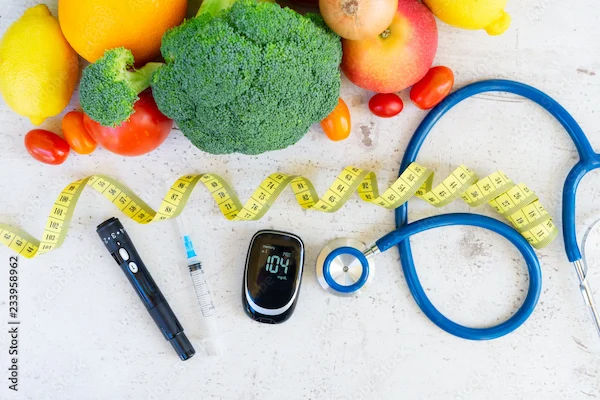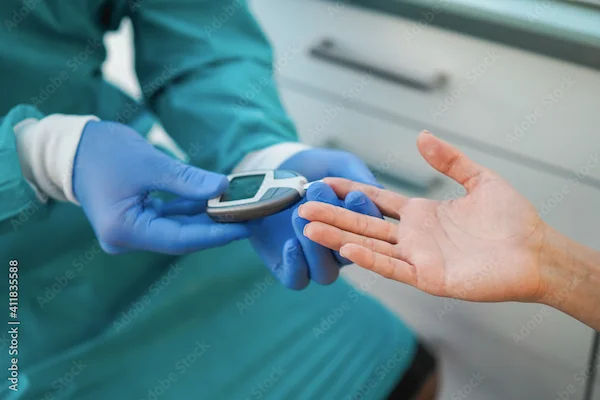Dates for Diabetes: Nutritional Benefits and Considerations
Discover the nutritional benefits of dates for diabetes, their impact on blood sugar levels, and important considerations for safe consumption in a diabetic diet.

Written by
Last updated on 3rd Jul, 2025
Managing diabetes involves making informed dietary choices to maintain stable blood sugar levels and overall health. One question that often arises is whether dates, a naturally sweet and nutrient-dense fruit, can fit into a diabetes-friendly diet. This article explores the nutritional profile of dates, their impact on blood sugar levels, potential health benefits, and how to incorporate them into a balanced meal plan for diabetes management
Nutritional Profile of Dates
Dates are a nutrient-dense fruit that can support overall health, making them a valuable addition to a balanced diet. Here's a detailed breakdown of their nutritional components:
Calories: A 100-gram serving of dates provides approximately 277 calories, making them an energy-dense snack.
Natural Sugars: Dates are high in natural sugars, primarily glucose, fructose, and sucrose. These sugars provide a quick source of energy. A single dried date can contain approximately 16 grams of sugar.
Fibre: Dates are an excellent source of dietary fibre, containing about 7 grams per 100 grams. Fiber helps regulate blood sugar levels by slowing down the absorption of sugar into the bloodstream, promoting satiety, and supporting digestive health.
Protein: Dates have a modest protein content, with around 2 grams per 100 grams, contributing to muscle repair and overall health.
Fat: Dates are very low in fat, with negligible amounts, making them heart-healthy.
Vitamins:
Vitamin B6: Supports brain health, aids in the conversion of food into energy, and assists in neurotransmitter production.
Vitamin K: Crucial for blood clotting and bone health.
Minerals:
Potassium (696 mg per 100 grams): Essential for maintaining healthy blood pressure, muscle function, and overall cardiovascular health.
Magnesium: Important for muscle and nerve function, blood sugar control, and bone health.
Iron: Vital for the formation of red blood cells and the transport of oxygen throughout the body.
Calcium: Important for bone health and muscle function.
Phosphorus: Works with calcium to build strong bones and teeth and plays a role in energy production and storage.
Antioxidants:
Flavonoids: Help reduce inflammation and protect cells from oxidative damage.
Carotenoids: Support eye health and may reduce the risk of certain chronic diseases.
Phenolic Acid: Possesses anti-inflammatory properties and contributes to heart health.
By incorporating dates into a diabetes-friendly diet, individuals can enjoy their numerous health benefits while maintaining stable blood sugar levels.
The Glycemic Index of Dates
The glycemic index (GI) measures how quickly a food raises blood sugar levels. Foods with a low GI are digested and absorbed slowly, leading to a gradual rise in blood sugar. Dates have a medium GI, typically ranging between 35 and 55, depending on the variety and ripeness.
How Dates Impact Blood Sugar Levels
Despite their natural sweetness, dates can be included in a diabetes-friendly diet when consumed in moderation. Here's how dates affect blood sugar levels:
Moderate Glycemic Impact: The fibre content in dates helps moderate their glycemic impact by slowing down sugar absorption. This means that, unlike refined sugars, dates do not cause rapid spikes in blood sugar levels.
Portion Control: Eating dates in small quantities (one or two dates at a time) can help manage their impact on blood sugar levels. Pairing dates with a source of protein or healthy fat, such as nuts, can further slow down sugar absorption and help maintain stable blood sugar levels.
Health Benefits of Dates for People with Diabetes
Beyond their blood sugar management advantages, dates offer several other health benefits that can be particularly advantageous for individuals with diabetes:
Rich in Antioxidants: The antioxidants in dates help reduce inflammation and protect cells from oxidative damage, which is important for preventing diabetes-related complications such as cardiovascular disease.
Promotes Digestive Health: The high fibre content in dates supports healthy digestion and regular bowel movements, reducing the risk of constipation and promoting gut health.
Supports Bone Health: Dates are a good source of minerals like calcium, magnesium, and phosphorus, essential for maintaining strong bones and preventing osteoporosis.
Boosts Energy Levels: The natural sugars in dates provide a quick and sustained energy source, making them a healthy alternative to sugary snacks.
Practical Ways to Incorporate Dates into a Diabetes-Friendly Diet
Dates can be a delicious and nutritious addition to your diet when consumed in moderation. Here are some practical ways to include them in a diabetes-friendly manner:
Portion Control: Limit your intake to 1-2 dates at a time. This helps manage the natural sugars they contain and prevents spikes in blood sugar levels.
Pair with Protein or Healthy Fats: Combine dates with a source of protein or healthy fats to slow down sugar absorption and provide a balanced snack. For instance:
Dates and Almonds: Stuff a date with a few almonds.
Dates and Nut Butter: Spread almond butter or peanut butter on a date for a satisfying snack.
Add to Salads: Chop dates and sprinkle them over salads to add natural sweetness and a nutrient boost. They pair well with leafy greens, nuts, and cheese.
Use in Smoothies: Blend one or two dates into your smoothies for natural sweetness. This can replace added sugars and enhance the nutritional content of your drink.
Incorporate into Baking: Use dates as a natural sweetener in baking recipes. Replace refined sugar with date paste in muffins, cookies, or energy bars. This provides a healthier alternative while maintaining sweetness.
Make Date Paste: Create date paste by blending pitted dates with a small amount of water until smooth. Use this paste as a natural sweetener in various recipes, such as oatmeal, yoghurt, or homemade sauces.
Enjoy in Moderation as a Snack: Eat dates as a standalone snack, but keep portion sizes small. Combining them with nuts or seeds can make it more balanced and nutritious.
Mix into Yogurt or Oatmeal: Add chopped dates to plain yoghurt or oatmeal for a naturally sweet and fibre-rich breakfast or snack. This combination can help maintain stable blood sugar levels.
Potential Risks and Precautions
While dates can be a healthy addition to a diabetes-friendly diet, there are some potential risks and precautions to consider:
High Caloric Density: Dates are calorie-dense, so it's important to consume them in moderation to avoid excessive calorie intake, which can lead to weight gain and negatively impact diabetes management.
Portion Size: Monitor portion sizes to prevent overconsumption of carbohydrates. One to two dates per serving is generally a safe amount.
Individual Response: Individual responses to dates can vary. It's essential to monitor blood sugar levels after consuming dates to understand how they affect your body.
Conclusion
Dates can be a nutritious and diabetes-friendly food when consumed in moderation. Their low to medium glycemic index, high fibre content, and rich nutrient profile make them suitable for managing blood sugar levels and supporting overall health. However, portion control is essential to prevent excessive calorie and carbohydrate intake. By incorporating dates into a balanced diet and pairing them with protein or healthy fats, individuals with diabetes can enjoy the health benefits of this delicious fruit without compromising blood sugar control.
If you have specific questions about how to include dates in your diabetes management plan, it's always a good idea to consult with a healthcare provider or dietitian for personalised advice.
Consult Top Endocrinologist
Consult Top Endocrinologist

Dr. Nithin Reddy Modhugu
Endocrinologist
6 Years • MBBS, MD (General Medicine), DNB (Endocrinology)
Hyderabad
Dr. Nithin's Endocrine Clinic, Hyderabad
(100+ Patients)
Dr. M.a. Mujeeb Afzal
Endocrinologist
13 Years • MBBS , MD (General medicine) , DM (Endocrinology)
Hyderabad
Diabetes Thyroid and Hormones (DTH) Clinic, Hyderabad

Dr. Gayatri S
Endocrinologist
4 Years • Suggested Qualifictaion- MBBS, MD (Internal Medicine), DM (ENDOCRINOLOGY)
Nellore
Narayana hospital, Nellore

Dr. Shiva Madan
Endocrinologist
10 Years • MBBS , MD (General medicine) , DM (Endocrinology)
Bikaner
Sushma diabetes and Endocrine center, Bikaner

Dr. Venkata Rakesh Chintala
Endocrinologist
8 Years • MBBS,MD( GEN MEDICINE), DM ( ENDOCRINOLOGY)
Krishna district
Sanjeevani Hospital, Krishna district



